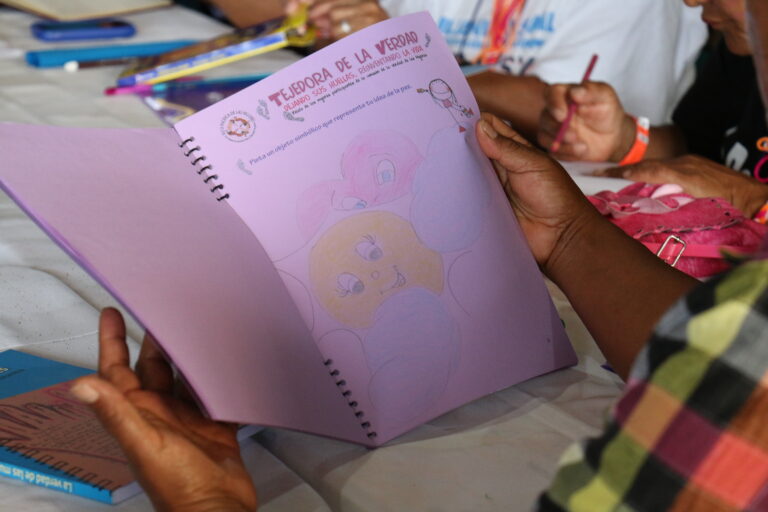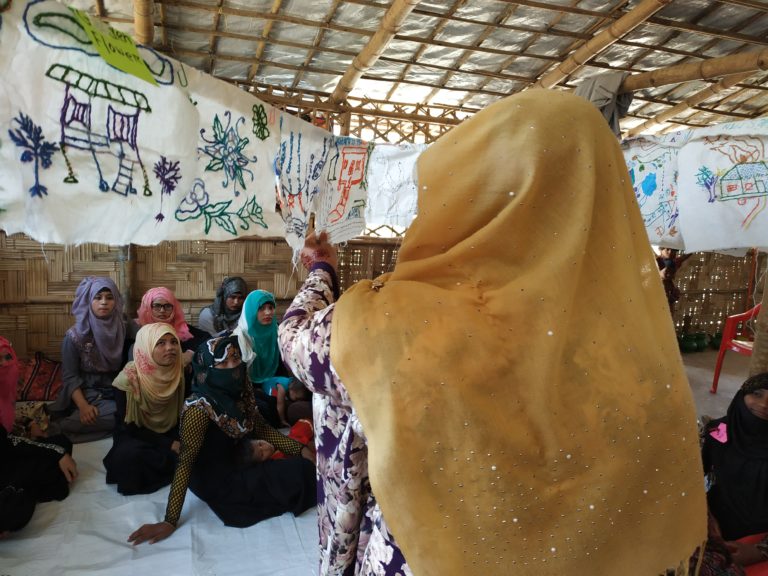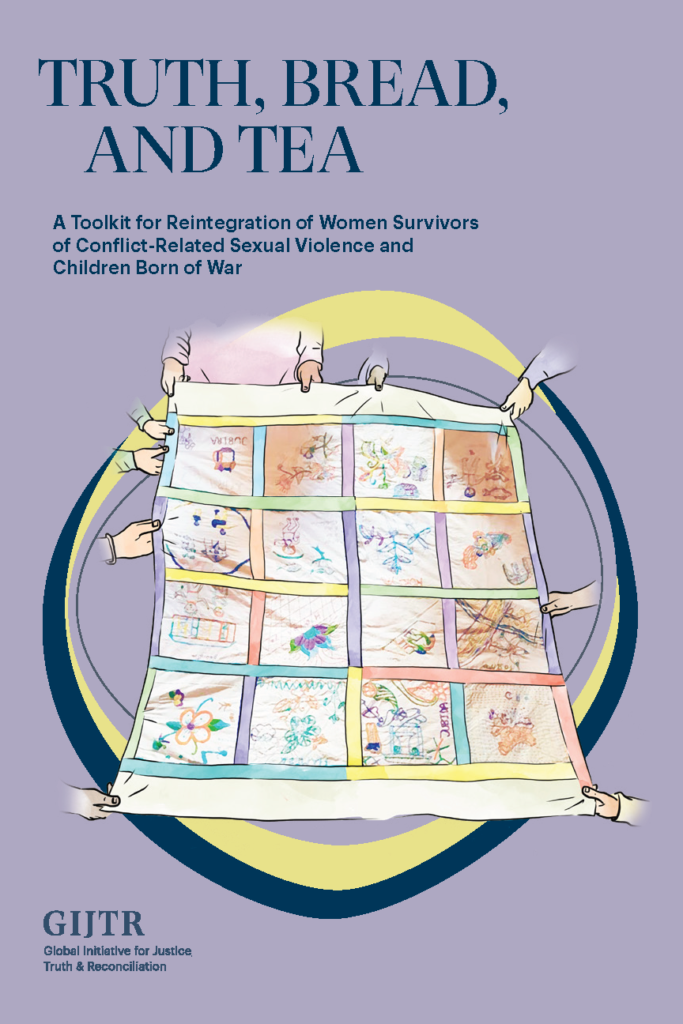CENTERING THE NEEDS OF SURVIVORS OF CONFLICT-RELATED SEXUAL VIOLENCE
Transitional justice processes have the potential to play a crucial role in the healing of victims of conflict-related sexual violence (CRSV) by providing opportunities for truth-telling around the circumstances through which these victims were assaulted or abducted, publicly recognizing them as victims and providing them with reparations. Through its vast experience, GIJTR partners are supporting the capacities of, developing trusting relationships with, and coordinating the efforts of local civil society organizations across the globe, working with these groups to document their stories in a timely, survivor-centered and systematic manner.

Background
Conflict-related sexual violence is a form of gender-based violence, linked directly or indirectly to a conflict, that is perpetrated against an individual or a group on the basis of their sex or gender. Defined by the UN as ‘rape, sexual slavery, forced prostitution, forced pregnancy, forced abortion, enforced sterilization, forced marriage, and any other form of sexual violence of comparable gravity perpetrated against women, men, girls, or boys,’ it is endemic in areas affected by conflict and humanitarian crises. The drivers and forms of conflict-related sexual violence differ across affected areas: in some contexts, it is used by parties to conflict to pursue strategic, military, or organizational objectives; in others, the breakdown of rule of law and protective systems create an environment where perpetrators (not necessarily parties to conflict) can more easily commit opportunistic acts of abuse.
As a form of violence grounded in gender inequality, women and girls are disproportionately affected by conflict-related sexual violence; in the UN Secretary General’s 2022 annual report on the issue, women and girls accounted for more than 2,297 (94%) of the reported cases. Barriers to reporting, which include unsafe reporting mechanisms for survivors in contexts where social norms mean sexual violence is condoned or tolerated within institutions, issues of physical access to services, and fear of reprisals from perpetrators, family or community, lead to underreporting or a lack of reporting through formal channels. Additionally, there are specific barriers facing men and boys, which include legal frameworks that do not recognize them as victims and/or can criminalize them for reporting sexual violence crimes. Prevalence figures should therefore be assumed to be estimates, and the true number of victims of conflict-related sexual violence is likely to be much higher.
The enduring impact of conflict-related sexual violence upon individual survivors and their communities requires a holistic, multisectoral and multidisciplinary response. States bear the primary responsibility for ensuring that survivors can access comprehensive medical, psychological, livelihood and judicial support services to enable them to rebuild their lives. Yet the reality facing many survivors around the world today is that they are unable to access even the basic care they need, due to resource challenges and/or a lack of state accountability for or prioritization of survivors’ needs. Against this backdrop, the Global Initiative for Justice, Truth and Reconciliation (GIJTR) has placed conflict-related sexual violence at the center of its work. From working with survivors of Da’esh atrocities in the Middle East, to developing Training of Trainer toolkits for human rights practitioners on topics such as the unique reintegration needs of children born of conflict-related sexual violence, GIJTR has responded to the urgent and long-term needs of survivors through a range of transitional justice initiatives.

Bangladesh
In Bangladesh, where nearly one million members of the Rohingya community now live in exile after fleeing persecution from Myanmar’s military, GIJTR partners have identified and trained female leaders to document human rights violations in preparation for community-led documentation missions. Whilst data on sexual violence following the military coup is limited, in its 2018 report to the UN Human Rights Council, the Independent International Fact-Finding Mission on Myanmar documented hundreds of cases of Rohingya women and girls being raped, gang raped and subjected to other forms of sexual violence in Rakhine State during the military’s “clearance operations” of 2016 and 2017. The majority of Rohingya refugees now living in Bangladesh are women and children, with more than 40 percent below the age of 12. Where other international agencies have conducted documentation initiatives with the Rohingya community, they have generally done so with local activists working only as interpreters or “fixers.” GIJTR’s experience, however, has shown that training documenters from within the community to lead these efforts is a far more effective approach. Unlike international efforts, locally-led and coordinated civil society documentation efforts can build trust among survivors, reach communities outside the scope of efforts led by external international organizations, and lay the groundwork for future transitional justice processes. As women and girls are frequently more likely to share their experiences of violations with female facilitators, due to cultural taboos around discussing sexual violence, training female leaders in documentation has been essential to collect and preserve their stories.

Ukraine
In Ukraine, where organizations with little previous experience of gathering and processing evidence of conflict-related sexual violence are now under huge pressure to undertake this work in line with international standards, following Russia’s full-scale invasion in February 2022, GIJTR partners have utilized a similar approach, providing training and psychosocial support to civil society documenters. In a context where many survivors are afraid to speak out due to stigma, the work of Ukrainian organizations, which are able to repeat missions to the same settlements to gradually build the trust of witnesses and survivors over time, is critical in uncovering these crimes, referring survivors to support services, and contributing to accountability efforts.
In The Gambia, women were largely excluded from providing input during the state’s consultations, which preceded the launch of the country’s Truth, Reconciliation and Reparations Commission (TRRC) in 2018. Once launched, the TRRC failed to make safe spaces available for women to give testimony, despite a breadth of evidence on the need to offer anonymity and privacy to women who have been abused or traumatized to enable them to participate safely in accountability processes. GIJTR’s experience evidences the need to involve marginalized groups, including women, in transitional justice processes, as if they are not part of developing those processes, they are neither well-positioned to nor deeply invested in moving them forward. Responding to this pressing need in The Gambia, GIJTR worked with local partner Women in Liberation and Leadership to conduct women-only Listening Circles over a three-year period, compiling the findings and recommendations into a report. The report, which was received positively by The Gambia’s Ministry of Justice, concluded that in order for the Truth, Reconciliation and Reparations Commission to offer justice to Gambian women and girls, it must acknowledge and address the root causes of sexual and gender-based violence in Gambian society, which existed long before the dictatorship and continue today.
In 2016, GIJTR partners established the Middle East and North Africa (MENA) Transitional Justice Academy to provide survivors, activists, academics, practitioners and other non-traditional actors with the skills and funds to design and implement transitional justice programs in their local communities across the region to increase awareness of these processes among the public and ensure their voices are included in them. Through the Academy, GIJTR supported a local partner to conduct workshops with former Syrian women detainees to increase their understanding of different types of documentation, how evidence they provided could be used for justice and healing purposes, and their rights when engaging with these processes. Interventions from participants – “There were organizations and individuals who collected our stories and surveyed us without telling us, even once, why they were collecting that information” – spoke to the need for the workshops, which helped to foster a greater sense of agency amongst the women who attended.

Training of Trainers
For more than a decade, civil society organizations in Asia, Africa, Latin America and Eastern Europe have developed knowledge and strategies working with survivors of sexual violence and their children. Through its work in these regions, GIJTR has seen that civil society organizations and survivor networks have a deep and rich understanding of their own context, but often have not been exposed to developments and innovations in other countries and do not always therefore benefit from advancements in the field. To promote greater of their unique social reintegration needs among human rights practitioners, GIJTR and its partners published a toolkit entitled ‘Truth, Bread and Tea’ drawing together lessons from practitioners working in a diverse range of contexts, capturing some of the challenges in transitional justice efforts to deal with the inclusion of female survivors of sexual violence and their children.
Through its work with survivors of conflict in Liberia, Kenya, Uganda, Sri Lanka and Guinea, GIJTR has pioneered the use of ‘body mapping’, an arts-based research method that can be used as a tool to allow survivors to remember and express their experiences in order to achieve a level of healing. In 2018, GIJTR published a toolkit to support organizations to use body mapping for advocacy, to raise awareness of survivors’ stories and advocate for the rights of victims in their country-specific contexts. GIJTR has since continued to utilize this method through its work in contexts such as The Gambia, where it partnered with a local organization to deliver training on how to conduct body mapping. The resulting body maps were included in an exhibit at Memory House, which was displayed for almost two years, to show the range of violations experienced by women before, during and after the dictatorship that were not covered by the TRRC.

